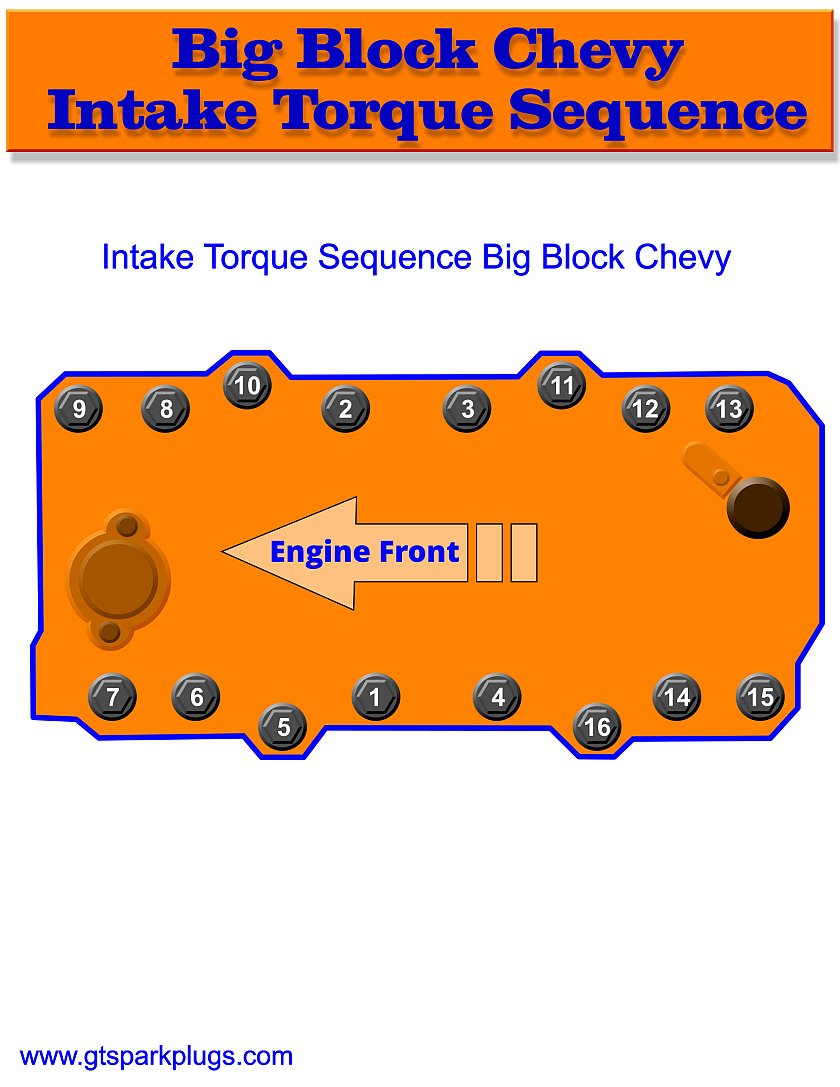Big Block Chevrolet Intake Torque Sequence
So we got that cool new dual quad tunnel ram and you are going to need to figure out how to get it on and torqued
properly. Make sure you follow the manufactures instructions (Edelbrock, Holley, Weiand, etc) for the proper
procedures. You will need a few things including the "Nuts, Bolts and Gaskets" as they say. Don't forget the gasket
sealer(s) torque wrench and this page. My preferences for gasket sealers on the race cars are Hylomar (Permatex
Version) for intake ports and a light coat of High temp RTV sealer for the water jackets and end seals. It's also a
good idea to coat bolts that enter the water jacket with some Permatex or similar bolt sealer.
Big Block Chevy Intake Bolt Torque Specifications
25 Ft/Lbs - Aluminum Heads
35 Ft/Lbs - Iron Heads
The torque spec can be anywhere from 25-35 on Iron heads, but for aluminum I tend to go towards the lower side.
IF you do have a spec from the manufacturer follow that. Make sure threads in the head are clean and in good
shape.
Make sure you follow the sequence in a couple of steps, worry about this more on old and aluminum manifolds.
Cast Iron is much more forgiving if you are unfortunate to have to use a boat anchor of an intake. They are HEAVY
on the BBC.
Some Common Intake Manifold Tips
If you have an old used manifold, before installing it, check for cracks, leaks and the threads in the thermostat
housing (often a problem area) and the threads in the bolt for the distributor clamp. You don't want to find out you
have to toss in a Helicoil or other insert while it's on the car. For the T-Stat housing and Distributor claps it's nice to
use studs.
Test fit your manifold with gaskets (no sealer). Make sure it looks like it will align. Milling heads and decking blocks
can make things not align properly and cause leaks.
Use good sealers, do not use silicon around intake ports, just the water ports. Some folks like to use the end seals,
I typically toss them and use a bead of silicon on the front and rear seals of the manifold. Do it in the way you are
most comfortable with. If tossing the end seals make sure things are totally clean an oil free.
Last thing is to be careful of the 5, 9, 10, 11, 16. These are often on weak parts of the manifold. Some manifold do
not have bolts 5, 10, 11, 16 as the ports are way too big to have a bolt hole smack in the middle. I don't know what
the 'Proper' technique is but I just skip to the next one in the sequence.

